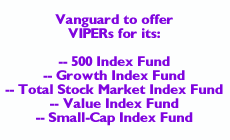|
Vanguard to offer VIPERs
|
 |
May 12, 2000: 5:54 p.m. ET
Firm enters exchange-traded fund game under price pressure
|
NEW YORK (CNNfn) - Vanguard, known as the low-cost provider of index funds for individual investors, seems prepared to defend its honor in what some are sizing up as a turf war with Barclays Global Investors.
The company said Friday it is seeking to offer exchange-traded fund shares - or what it is calling VIPERs - for its U.S. stock index funds, including the popular Vanguard 500 Index Fund.
Such shares, which will trade on the American Stock Exchange, price continuously throughout a trading day and are bought and sold like stocks. Traditional mutual funds, by contrast, only price once at the end of the day.
The company, which has filed its request with the Securities and Exchange Commission, made its announcement just a week before Barclays Global Investors, a favorite manager for institutional money, will begin its month-long launch of 28 low-cost exchanged-traded index funds on AMEX. The expense ratios for those funds may undercut that of the Vanguard 500 Index by as much as half.
If Vanguard gets the go-ahead, its VIPERs could be available as early as the third quarter of this year, company spokesman John E. Demming said.
Price war - how low can you go?
Vanguard said in a statement it initially will only offer VIPERs (Vanguard Index Participation Equity Receipts) for five of its nine index funds - the Vanguard 500 Index, Vanguard Growth Index, Vanguard Total Stock Market Index, Vanguard Value Index and Vanguard Small-Cap Index.
 But the company has not yet set its expense ratios. When it does, it will eye how low Barclays goes with its funds, said Dan Wiener, editor of the Independent Advisor for Vanguard Investors. But the company has not yet set its expense ratios. When it does, it will eye how low Barclays goes with its funds, said Dan Wiener, editor of the Independent Advisor for Vanguard Investors.
The Barclays funds likely will charge between 8 to 10 basis points (or 0.08 percent to 0.10 percent), a Barclays spokesman said, far less than the 18 basis points (or 0.18 percent) charged to investors in the traditional Vanguard 500 Index Fund.
"The ETF thing really hit Vanguard in the solar plexus," Wiener said. "They're worried about losing their lunch to Barclays."
Morningstar analyst Scott Cooley expects Vanguard's ETF expense ratios will be at least in line with Barclays, possibly lower.
The lure of ETFs
Vanguard said its incentive to enter ETFs is due primarily to a desire to attract short-term investors away from its traditional index funds. "They can drive up transaction costs that are borne by the shareholders," Demming said.
When asked about any pressure the company may have felt by Barclays' new funds, Demming said due to restrictions connected to Vanguard's SEC application, "I can't comment on the expense ratio." But, he added, "We've been looking at (ETFs) for more than a decade."
Although the field of ETFs is still small, the vehicles have become attractive to investors as their desire for real-time information has grown alongside their wish for greater flexibility in where and when they can invest and a desire to keep fund costs - including capital gains distributions - to a minimum.
With ETFs, investors can trade their shares and track the price on their holdings throughout the day. With mutual funds, investors usually buy or sell their holdings at the net asset value, which is set at the end of the day. Wiener noted that investors with Vanguard index funds in taxable accounts may only issue an order to buy or sell by letter. They are not permitted to trade online or by phone.
Since ETFs are sold like stocks, they are available through any broker and there is no redemption penalty per se.
And for those so inclined, investors can short the ETF shares or buy them on margin.
In terms of tax-efficiency, ETFs, like traditional index funds, have relatively low turnover since they track an index of stocks. But unlike a regular fund, where a portfolio manager must sell stock to cover redemptions in the fund and distribute any resulting capital gains to remaining fund investors, when an ETF investor sells his or her stake it is sold to another ETF investor, thereby keeping the stake in play.
Are ETFs for you?
ETFs may work well for two types of investors, Wiener said: those who have large amounts of money and are willing to pay the cost of trading frequently for the benefit of timing the market, and buy-and-hold investors who will trade infrequently over a long period of time.
But analysts agree ETFs are not cost-efficient for the small investor in a taxable account or a 401(k) if they contribute to their funds using dollar-cost averaging - a process by which you invest a fixed amount at regular intervals.
Say you invest $100 a month in an S&P 500 index fund. Since you will pay a commission to a brokerage each time you buy or sell an exchange-traded share, you might end up paying between 8 percent and 30 percent of that $100 every month, thereby canceling out any benefits of a reduced expense ratio.
"They just don't make sense for (small investors). They'll get eaten up by the commissions," Cooley said. 
|
|
|
|
|
|
Vanguard
|
Note: Pages will open in a new browser window
External sites are not endorsed by CNNmoney
|
|
|
|
 |

|

